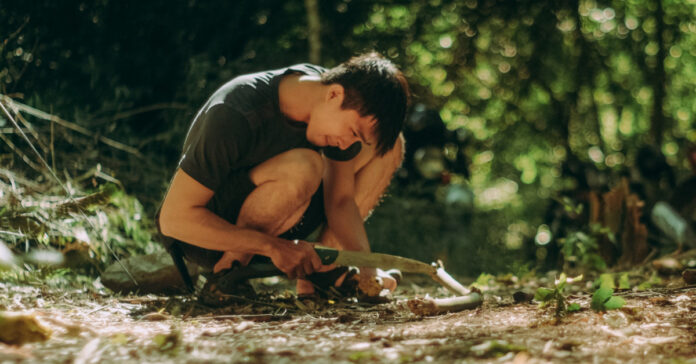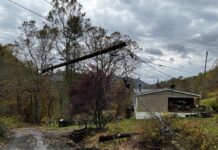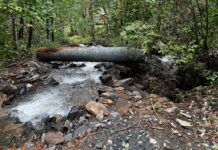I’ve never started a fire using a bow or rubbing two sticks together, but I carry a lighter on my person and my EDC bag includes a backup lighter, some tinder, and a ferro rod. My car survival kit includes the same, plus waterproof matches, dried kindling in a ziplock baggie, and some Esbit tablets that burn for 12 minutes and reach 1300°F. They will get a fire going in any weather.
I carry a folding knife every day and I have a Cold Steel SRK in my EDC bag. There is a small machete in my truck plus a hatchet and folding saw. I have another two dozen knives that I’ve accumulated over the years that are perfect for everything from batonning a log to skinning small game. Of course, I can’t carry them all at once.
With a knife, I can whittle trap triggers and tent pegs. I can make a lean-to, build improvised shelters and rig a poncho in several different ways. I even know how to make cordage if I don’t have any on hand.
These and other bushcrafting skills may be useful, but I think you can be a good prepper without them. Still, they can’t hurt.
Wilderness Skills
I know only one guy who I could drop off in the wilderness with the contents of his EDC bag and his pockets and expect to find him alive in three months. I know many others who would never make it for three weeks. This fellow is a primitive living instructor and a member of several groups who do things like make their own bow and arrows, kill a deer, and produce their own buckskin clothing. He has practiced the art of primitive living for more than a long weekend.
There may be other experts, like Dave Canterbury, who could survive in the wilderness in a post-SHTF environment, but for the rest of us, I don’t see living in the wild as a successful long-term survival strategy unless you have some advanced tools. Give someone a log cabin in the wilderness with a wood stove, some cast iron cookware, an axe, and a saw and possibly a firearm, and their odds of survival will go up, or at least the length of time they can survive will increase. Unfortunately, there are only so many hunting cabins out there in the wilderness waiting for you to stumble across them. And if you do, what are the odds of it being unoccupied? You need to have your own retreat and stock it with food, gear, and tools.
From my perspective, wilderness survival skills add value in three ways:
- You will need these skills when you are bugging out, especially if you are forced to hike to your well-stocked retreat or transition from one place to another.
- When on patrol in the area around your retreat, wilderness skills will be useful. They can help you travel quietly, avoid detection, and survive a few days in the wilderness with minimal supplies.
- Possibly the most important benefit is these skills can provide wild food via hunting, trapping and gathering to feed yourself and others while you are in your retreat, thereby extending the life of your stored food.
Bushcrafting is a Last Resort
Bushcrafting skills, wilderness survival skills, and primitive living skills are useful. Knowing how to light a fire, use a knife, trap an animal, or build emergency shelter are good things to know, but I do not believe most preppers can survive for long with the supplies they can carry on your back and the skills they have in their head. I expect the odds are better in a tropical environment with warm weather, fruits, fish and other abundant wild food. Unfortunately, most of us don’t live in such an area and often have to deal with cold temperatures. Unless you can pull salmon from the river or kill a bull moose when it gets cold, surviving a cold winter in the wilderness will present a huge challenge.
I know this will hurt the feelings of some who are serious about surviving in the wild, but if you have to resort to using your bushcrafting skills to survive, something has gone wrong. Maybe your planning and preparations were insufficient. Maybe you ran out of food or ammo. Perhaps your choice of where to live was sub-optimal. Maybe a superior force forced you to abandon your preps. In any case, it is good to have bushcrafting skills to fall back on, but you should use them as a way to survive while you transition to a more permanent living situation. Don’t rely on them to keep you alive in a multi-year survival situation.
Alone in the Wilderness
Have you ever watched the TV show Alone? Contestants are dropped off in wilderness areas and must survive alone given a limited amount of supplies. Sure, this is a made-for-TV game, but we can still learn from it.
Even though the “limited” amount of supplies is more than you can carry if bugging out, the longest anyone has survived is 100 days, while the next best lasted 87 days. Most of the second and third place finishers dropped out because of starvation and hunger. People who dropped out earlier were mentally unprepared, got injured, or were pulled for medical reasons.
All the winners through nine seasons have been male and most of them lasted only about 75 days. Ask yourself: What are the odds you are going to do better than these folks? Does having a spouse or children improve those odds?
Don’t Devolve
There are plenty of stories of mountain men in the Great American West, of trappers and hunters who disappeared in the forests or mountains for months and maybe came down to trading posts only a few times a year. Maye you think you can be like them. Perhaps so, if you have a few pack animals loaded with supplies and a way to pick up more flour, sugar and bullets a couple of times a year. But in a TEOTWAWKI situation, you’re going to be on your own. Resupply will mean finding someone else’s stash.
There is a reason nomadic tribes covered wide areas and relied on their herds for food, fabric and transportation. There’s a reason people formed villages and farms when they realized land could be cultivated. That reason is survival. Humans transitioned from living in the wild to being organized nomads to staying in one place because it made their lives easier and their chances of survival greater. A major disaster is going to set us back 150 years. It’s going to be hard enough to survive aafter a disaster without going back a few thousand and living a primitive life making flint knives and wooden arrows.
Not as Easy as it Looks
Bushcrafting skills are worth practicing and could be valuable in a number of scenarios, but they should be your fallback plan, not your primary plan of action.
The YouTube channels on bushcraft and the NatGeo shows about people living in Alaska make it look easy and fun, but unless you’ve been raised in the wilderness, surviving in it won’t be easy.
If you like the idea of wilderness survival, then buy 40 acres in or butting up to a wilderness area and build yourself a cabin. Stock it with everything you think you need and then live there for a year. Once a quarter, assuming you make it that long, go out and buy everything you wished you had in the prior 90 days, restock your supplies, and try again. After a year or two, you’ll know what it takes to survive in the wilderness. I expect it will be more than a sharp knife and a ferro rod.








